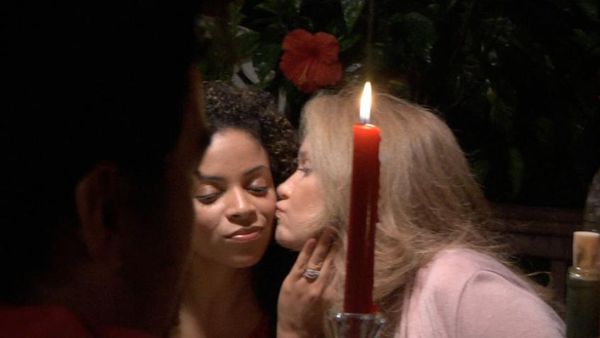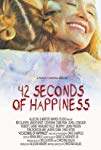Eye For Film >> Movies >> 42 Seconds Of Happiness (2016) Film Review
42 Seconds Of Happiness
Reviewed by: Jennie Kermode

How many sins are explained away with the simple excuse of just wanting the family to be all together?
There's a bit more excuse, perhaps, when people are getting married - in this case Cybil (Becca Ayers) and Maria (Margaret Kelly Murphy). Close friends and family members are happy to be there all together but brother Tomas' (Robert Z Grant) is less than happy about the decision to invite his ex, Alis (Lauren Sowa), and things get even worse when she turns up with her new partner, Marc (John J Concado) in tow - a man she started sleeping with when she and Tomas were still officially together. Inevitably, people take sides, and the first part of the film is taken up by frantic argument. Only the following morning does it emerge that there was a reason for both Tomas and Alis being invited - but then something else happens that makes all that anger pale into insignificance and changes the way that the characters and audience view the situation.
Christina Kallas has since attracted more widespread attention with high school-set mystery The Rainbow Experiment but this début film, which draws on her television series 42 Short Films On 42 Seconds Of Happiness, shows an unusual degree of creative confidence. It too is experimental and artistically ambitious, and as such it really won't work for everyone, but in light of its focus on the subject of communication it seems entirely appropriate that it should test the boundaries of what cinemagoers are comfortable with, seeking new or better ways of communicating with them.
One cannot approach this film on a wholly casual basis. Watching that first argument feels like arriving at a party where everybody already knows everybody else and one is left on the fringes trying to figure out what's going on. Given the effort this requires from the viewer, it probably runs a little too long, and some people will give up or stop concentrating before the critical shift of gears. Nevertheless, effort is rewarded. Whilst at first it might seem impossible to make sense of a lot of people shouting over each other, there's a lot of important information to be found in these exchanges, relating to both narrative and character, and excellent sound mixing by Jason Obenschain ensures that the right bits of dialogue always come to the fore. The experience also provides insights into social aspects of conversation that go beyond dialogue, with the use of tone and volume just as important in the way individual characters assert themselves, the clustering of voices as important in establishing allegiances and intimidating those who come into conflict with the group.
In the surrounding scenes, Kallas exhibits her fondness for split screen techniques, sometimes using them to show events happening simultaneously and sometimes giving us different angles on the same character or different versions, perhaps shifted slightly in time, of an individual's reaction to an emotional blow - the sort of effect one might get when comparing the reality of an incident to a memory of it. In one sequence, where Tomas is struggling to hold his emotions in check, it creates the sense of frantic activity all around him in the house, adding to his social anxiety. A scene in which we see Marc quietly drinking in a garage with a young man who has come to help out is perhaps the quietest, most straightforwardly presented moment in the film. He is, for a little while, distant from his troubles, an old wedding ring slipped off his finger. There's a sense that this is the calm before the storm.
A storm is coming - literally. We track its progress in typed alerts which most of the characters play scant attention to. Together with the steadily falling rain it adds to the tension because we know that these people could find themselves trapped together. Kallas, however, isn't interested in the conventional process of simply pushing people to crisis point and watching them explode at each other. She wants to know what happens afterwards, and it's there that the film really hits its stride. The ensemble cast get to show us what they're capable of in a series of complex emotional vignettes. Nothing is ever straightforward but, the film suggests, we all knew that already, so shouldn't there be room for a bit more sympathy, for working together to find a middle ground?
This is a film possessed of a rare emotional intelligence. It doesn't wrap everything up neatly but finds hope in the acceptance of loose ends. It's a brave piece of work, skilfully crafted and brimming over with talent, a fantastic calling card for all involved.
Reviewed on: 30 May 2019















